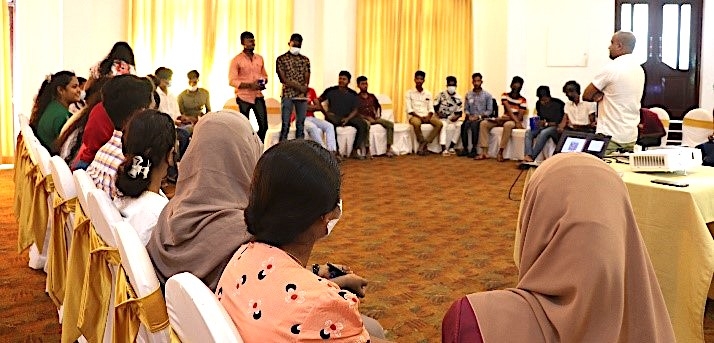Three programmes on pluralism to provide knowledge, skills and attitudes to recognize the pluralistic nature of the society were carried out targeting 137 youth wing members in Beruwala, Vavuniya and Trincomalee under NPC’s Action for Religious Coexistence (ARC) project.
The intervention envisages that the youth wings will act as leaders in their locations to mobilise and empower communities to bring forward the discourse of pluralism and religious inclusivity. In this context, the intervention has given importance to the trainings on pluralism to direct the community groups to respect and appreciate diversity. The youth wings consist of members belonging to different ethnic and religious communities. They interact with diverse groups and communities through their work.
The training programmes have been developed to enhance these community leaders’ skills, knowledge and attitudes to promote cultural, behavioural and attitudinal diversity while focusing on the concept of pluralism, understanding and acceptance and how diversity plays a significant role in society.
Poorna Sathyajith is a member of the National Youth Council. She believed she could contribute to strengthening social cohesion among different ethno-religious groups. “The divisions based on socio-economic status have divided us. It is sad that people only think of themselves. They do not realise the importance of pluralistic values. Lack of understanding of pluralism can lead to negative consequences, which is why we need to educate the general public on the importance of practicing pluralistic values,” she said.
M.M.F. Fazeena in Beruwala expressed her gratitude for the establishment of youth wings as a way to develop new relationships with youth from other ethnicities. “I only had Muslim friends. By joining the youth wing, for the first time I made Sinhala friends. Now we talk with each other and share our ideas and values. Through the training, I realised how religious conflicts and tensions can impact on our lives. What we all want is peace. I believe we can inspire others to recognise the need for inclusivity,” she said.
Interactive tools and techniques were used during the training based on participatory learning principles to encourage a productive dialogue among participants in different thematic areas. Tariq Shareefa, a youth wing member in Vavuniya, stated, “The most interesting part was the role play. Through the activity we understood the experiences of marginalised groups who have been excluded by society. I was able to understand others’ problems. For me, that session was emotional and I feel that I have a responsibility to strengthen religious co-existence in our areas.”
Mahendiran Dilaxan pointed out the consequences of war and how it has impacted on the lives of youth. He believed youth had a role in mitigating conflict situations. “We were born in a time of war.
Although it ended in 2009, people are not ready to be united or reconciled. We are experiencing a terrible economic crisis. It is time to forget our differences. We should develop a common identity as Sri Lankans so that the strong unity among us will help us to overcome the prevailing challenges as a nation.”
Mohamed Sabrin, an active member of the youth wing in Trincomalee, believed that the political and social marginalisation of some communities had undermined the values of unity. “As a result of existing social divisions, we are still an underdeveloped country. That is why we should try to make an attitudinal change in society. The unity among different ethno-religious groups is crucial in ensuring religious freedom,” he said.

